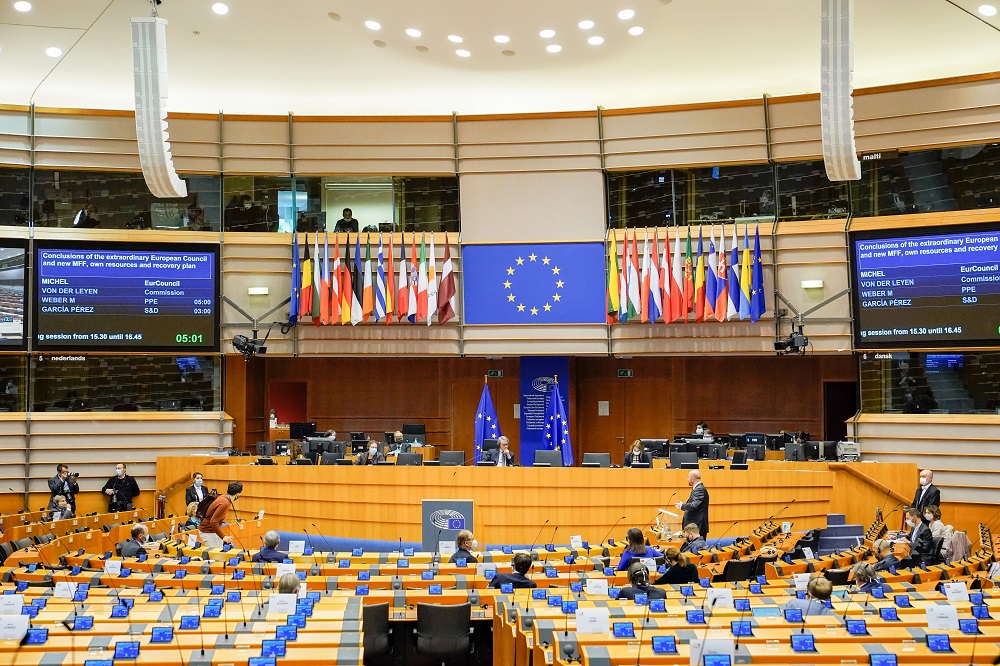Written by Katarzyna Sochacka and Clare Ferguson,

The May 2020 plenary session was the third conducted with a majority of Members participating remotely, although more were present in Brussels than at the April session, and using the alternative voting procedure put in place in March by Parliament’s Bureau. The session focused on a number of urgent legislative proposals as well as votes on discharge for EU institutions and bodies concerning the 2018 budget. On the response to the Covid‑19 pandemic, Parliament called upon the European Commission to set up a recovery plan as part of the 2021-2027 multiannual financial framework (MFF). Members heard Council and Commission statements on the conclusions of the video-conference meeting of the European Council on 23 April 2020 and the MFF, own resources and recovery plan. They also debated statements relating to: emergency legislation in Hungary and its impact on the rule of law and fundamental rights; on the use of contact-tracing apps; and on vaccines and therapeutics. Members also held a debate on the 70th anniversary of the Schuman Declaration.
Coronavirus transport support package
After voting to invoke Rule 163 of Parliament’s Rules of Procedure on applying the urgent procedure, Members adopted, with some amendments and by very large majorities, first-reading positions on four immediate measures to support the transport sector. The measures cover all transport modes (aviation, rail, maritime, inland navigation and road), seeking to ease some of the practical issues facing transport operators due to the coronavirus crisis, especially on costs and the regulatory burden. Member States’ ambassadors to the EU (Coreper) have also agreed to use written procedure to adopt these measures swiftly.
2021-2027 multiannual financial framework
Members addressed the prospects for future financing for the EU and its Covid‑19 recovery plan. Parliament adopted, by 505 votes (an absolute majority is required), a Committee on Budgets legislative initiative report requesting the European Commission make a legislative proposal to set up a contingency plan for the EU MFF, where lengthy negotiations in the European Council and Council have delayed agreement and the coronavirus outbreak has exacerbated both the delay and its consequences. The Treaties provide for extension of the annual level of resources available in the final year of the current MFF, until agreement is reached. However, there is a risk to the smooth functioning of the EU budget, since many of the EU’s current programmes will expire at the end of 2020, unless the new budget, or a contingency plan, are agreed soon.
Parliament also adopted a resolution on the next MFF, own resources and the recovery plan, in which it emphasised the need for the recovery plan to be built on the MFF, and for Parliament to be fully involved in decision-making on the recovery plan in order to ensure democratic accountability. The Commission announced that it expects to make a proposal on the Covid-19 post-pandemic recovery plan as well as its revised 2021-2027 MFF proposals on 27 May 2020. Parliament is expected to organise a plenary session that day in order for the Commission to prevent its new proposals directly to Members and to allow Parliament to give its immediate reactions.
EU bodies – Budgetary discharge 2018
To ensure correct management of EU funds, the European Commission and executive agencies, as well as the other EU institutions, the decentralised agencies and joint undertakings are required to present their ‘accounts’ for scrutiny each year. In this exercise covering the 2018 financial year, Members voted on 56 reports from Parliament’s Committee on Budgetary Control (CONT), which scrutinise each EU entity’s use of EU funding and recommend whether or not to grant approval (discharge). Parliament granted discharge for the European Commission, and six agencies, as well as for the Commission’s disbursement of European Development Funds. Parliament granted discharge for 32 EU decentralised agencies and 8 joint undertakings, and for the EU institutions other than the Commission, except, once again (as has been the case since 2009), the European Council and the Council. Parliament agreed to postpone a decision in the light of continued lack of cooperation with these two institutions. In addition, Parliament decided to postpone discharge in respect of the Economic and Social Committee, until the Committee provides evidence that it has taken measures regarding cases of alleged harassment.
Macro-financial assistance to enlargement and neighbourhood partners
Members approved a Commission proposal, tabled without a report by Parliament’s Committee on International Trade, seeking to provide enlargement and neighbourhood partners with macro-financial assistance (MFA) to mitigate the effects of Covid‑19. The MFA package will provide €3 billion to help enlargement candidate and southern neighbourhood countries facing a recession.
Fisheries Partnership Agreement between the EU and Mauritania
Members followed a PECH committee recommendation that Parliament agree to a one-year extension of the Protocol on the Fisheries Partnership Agreement between the EU and Mauritania, currently under renegotiation. The agreement rolls over an existing extension to the 2015 agreement whereby the EU gains access rights to Mauritania’s mixed fisheries in return for €61 625 in payment and support for the country’s fisheries sector.
Opening of trilogue negotiations
Two committee decisions to enter into interinstitutional (trilogue) negotiations were confirmed. In the case of the AGRI committee’s report on the proposal on transitional funding provisions for the year 2021, Parliament voted in favour of the decision. The PECH committee’s report on Eastern Baltic cod fishing was confirmed with no vote taking place.
Read this ‘at a glance’ on ‘Plenary round-up – Brussels, May 2020‘ in the Think Tank pages of the European Parliament.








[…] Source Article from https://epthinktank.eu/2020/05/18/plenary-round-up-brussels-may-2020/ […]